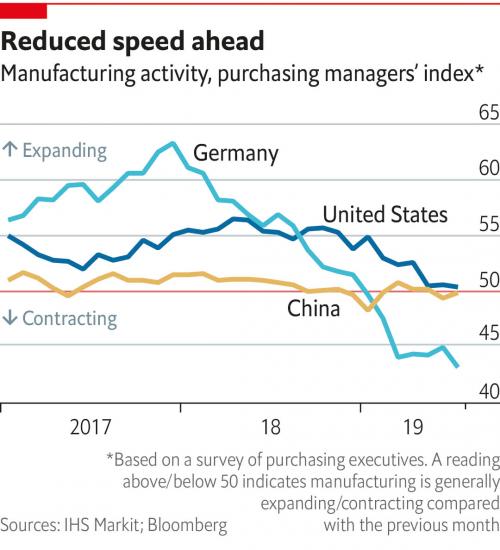Market Action
Global equities closed down after a volatile week as trade friction and slowing global growth sent bond yields lower. The yield on the US 10-year Treasury note declined to 1.54% from 1.70% a week ago. Oil prices were little changed, with a barrel of West Texas Intermediate crude rising $0.60 to $54.85. Volatility, as measured by the Chicago Board Options Exchange Volatility Index (VIX), rose to 19.5 from 18.6 last week.
Air traffic out of Hong Kong was severely disrupted this week as protestors occupied the city’s international airport and clashed with police. The prolonged nature of the protests has resulted in Hong Kong’s government suggesting it will downgrade its forecast for GDP to 0-1% this year from its earlier 2-3% forecast. The government also unveiled an economic support package worth $2.4 billion to offset some of the economic drag from the demonstrations. US President Trump this week for the first time linked the protests in Hong Kong to the ongoing trade negotiations with China, saying the country must respond humanely to the protests if it wants to strike a trade deal. Trump’s remarks came amid signs that the Chinese government is gearing up to employ the Chinese People’s Armed Police to quell the protests, massing a force in Shenzhen just across the border from Hong Kong.
Markets reflected optimism midweek as the United States announced it was delaying the imposition of tariffs on several categories of imports from China until after the holiday season, but that news did not dissuade China from announcing that it intends to take necessary countermeasures to match the US tariffs. Face-to-face negotiations are expected to resume within two weeks, and China has asked the US to meet it halfway on trade issues.
The spread between the US two-year Treasury note and the 10-year note fell below zero for a time this week, setting off recession warning bells. However, the inversion is not yet persistent, and in the past five such episodes the onset of recession averaged 22 months after inversion. Global bond yields continue to tumble, with US 10-year notes falling to their lowest level in three years and German, British and Japanese yields falling to record lows. The US 30-year bond yield fell below 2% for the first time on record.
Incumbent Argentine President Mauricio Macri suffered a shockingly large defeat in the primary stage of Argentina’s presidential election on Sunday, losing to Peronist Alfredo Fernandez by 15 points. Polls had predicted a close race in advance of October’s election. Markets plunged on the outcome, pricing in the prospect that the market-friendly Macri will almost certainly be defeated by the left-leaning Fernandez this fall, opening up the possibility of another debt restructuring.
Germany’s economy contracted in 0.1% in Q2 as the ongoing slowdown in global trade crimped exports. News this week that economic sentiment in Germany spiraled lower in August suggests a strong rebound in the third quarter is unlikely.
US economic data showed relative resilience as core retail sales expanded 1% in July and regional Fed surveys from New York and Philadelphia beat expectations. However, industrial production slipped in July as the manufacturing sector remains challenged.
What Could Affect the Markets in the Days Ahead
Anticipation of an aggressive package of additional easing measures from the European Central Bank at its September meeting is helping fuel the global bond rally after a member of the bank’s governing council made a forceful case for additional accommodation in an interview with the Wall Street Journal, and Finnish central banker Olli Rehn tweeted out a link to the article. Rehn said the ECB is preparing a strong package of measures and that it is important to overshoot expectations rather than undershoot. The starkest example of Rehn’s determination to signal a strong move was his assertion that the ECB has not ruled out purchasing equities as part of its quantitative easing program, a once-unthinkable prospect.
Brexit uncertainty continues to build as opposition lawmakers and rebel Conservatives discuss tabling a no-confidence motion when the British Parliament returns on 3 September. A general election is looking increasingly likely, though the timing remains unclear.
Italian Prime Minister Giuseppe Conte addresses the Italian Senate on Tuesday in the wake of a call for new elections by Matteo Salvini, the leader of the League, and that could result in a vote of no confidence. Italy’s president, Sergio Mattarella, could then cobble together another governing coalition, potentially teaming the Five Star Movement with the Democratic Party, or he could call a general election, which polls suggest would be won by the right-leaning League
This Week From BlackSummit
Another Perspective on the Recent Market Turmoil: Squandering the Stewardship of the International System
John E. Charalambakis
Recommended Reads
Warning Signs Point to a Global Slowdown – WSJ
Modi’s shock Kashmir move threatens India’s standing on world’s stage
How America Lost Faith in Expertise | Foreign Affairs
A Green Economy Grows in Denmark – Bloomberg
The Bond Market Smells Big Trouble. Where to Hide. – Barron’s
What happens when the world cannot rely on the US? | Financial Times
Opinion: 20 years of Vladimir Putin destabilizing the world
Image of the Week

